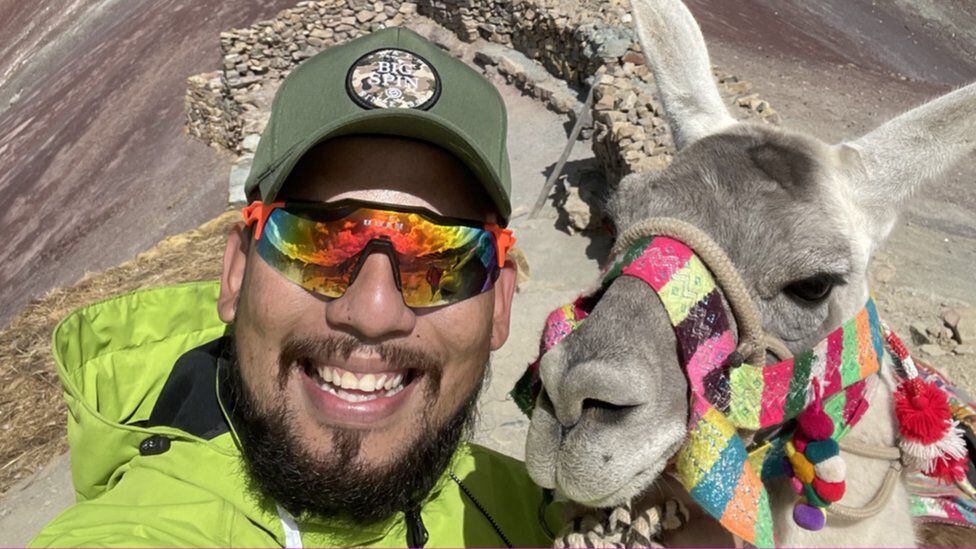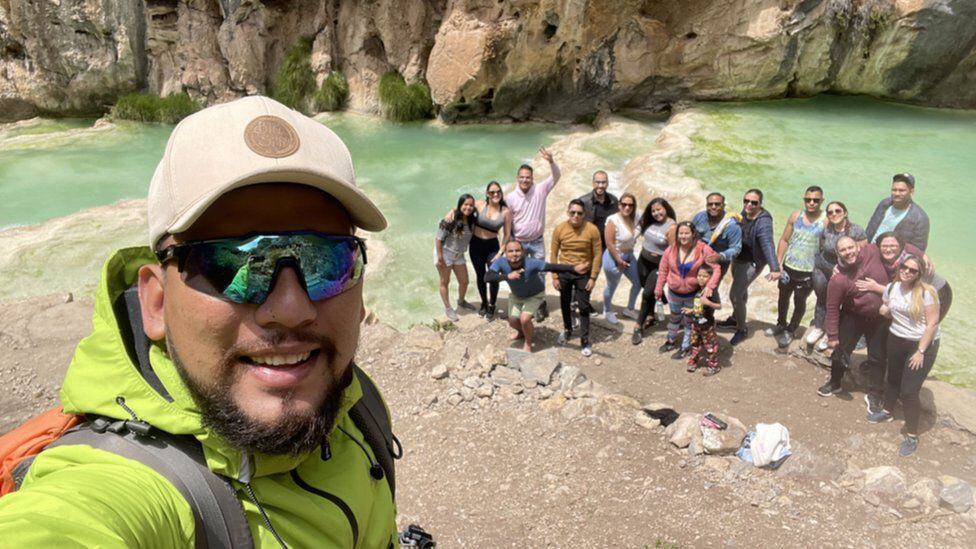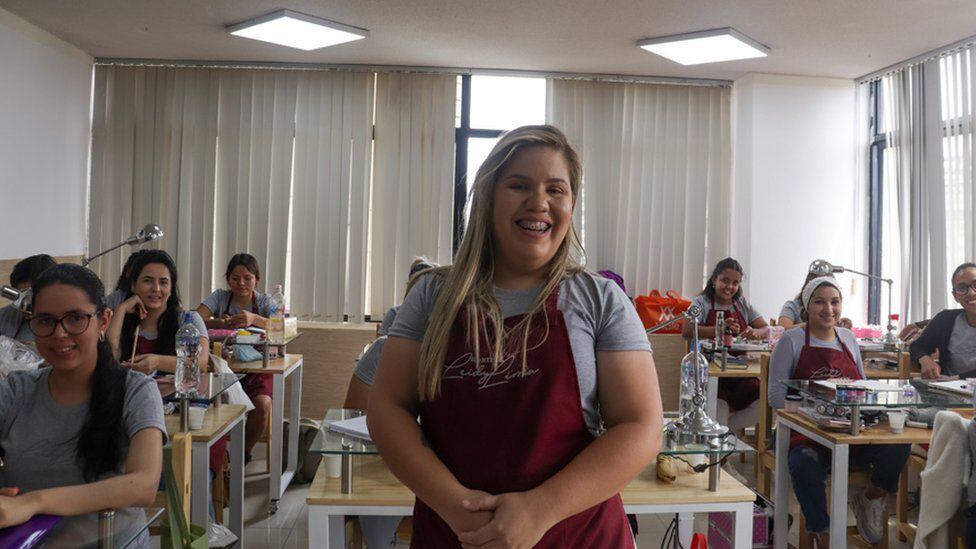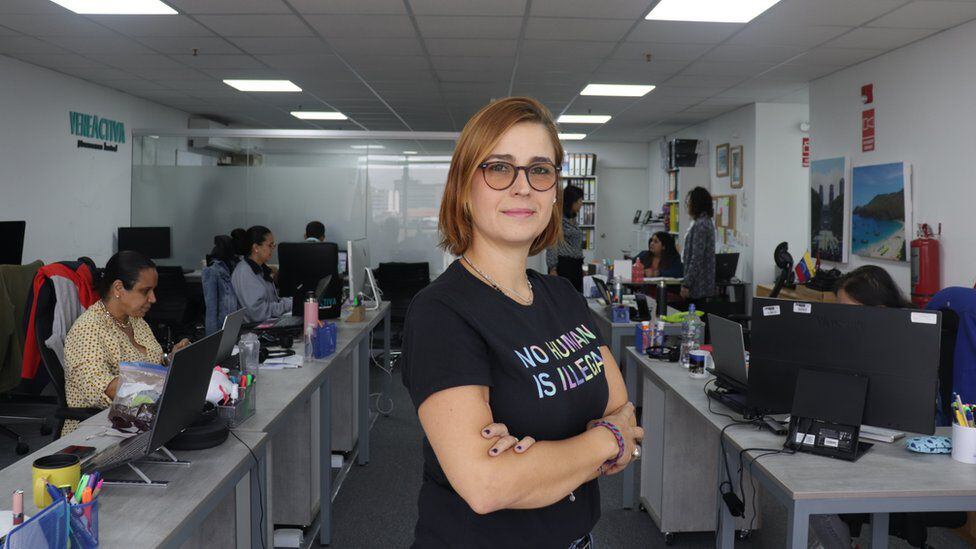Peru has become one of the preferred destinations for Venezuelans who leave their country due to the crisis they have suffered for years.
The latest estimates from the United Nations High Commissioner for Refugees (UNHCR) indicate that there are 1.28 million Venezuelans in the country.
LOOK: The Mexican who spent decades looking for the stranger who saved her life
Their influx has been a great challenge and is often associated with an alleged increase in citizen insecurity that the Prime Minister, Aníbal Torres, has set as the “biggest problem” in the country and has led the government to declare a state of emergency in the provinces of Lima and Callao, the most populated.
However, a recent study by the Konrad Adenauer Foundation and the Antonio Ruiz de Montoya University points out that “the coverage of many media outlets generates a distorted perception of the magnitude of Venezuelan crime and the idea of a causal link between migration and criminality. “.
Other studies have shown the positive impact that the arrival of Venezuelan migrants has had on the Peruvian economy. The Central Bank reported in 2018 that Venezuelans contributed 0.33% to the growth of the Gross Domestic Product.
And according to the Center for Economic Development of the Equilibrium Group, 40% of those who arrive have higher education, which represents a human capital that Peru can benefit from.
You don’t have to look far in the country to find examples of Venezuelans who have found a better life in Peru, but who have also made Peru better.
Chucho, the tireless traveler
The life of Jesús Andrés Rubio, 29, erupted in 2014.
Chucho, as he is called, was one of the many Venezuelan students who took to the streets to protest against the government of Nicholas Maduro.
His activism in an opposition party and his popularity among his neighbors made him an emerging figure in politics in his hometown of Valera, in western Venezuela.
In 2015 he was hit by a car, an accident that changed his life.
He fell into a coma and when he woke up he had lost his speech and memory, he says. He didn’t even recognize the young woman with whom he had started a relationship a few months before the hit-and-run.
Only after nine operations and months of rehabilitation with Cuban doctors was he able to speak and walk again. The new Chucho had metal plates on his skull, collarbone, arms and legs.
Although he says that he recovered some of his memory, he never remembered anything that happened in his life before he turned 18. “I felt very frustrated, because many people came to greet me with affection and I had to pretend to be glad to see them when in reality I did not remember them,” he told BBC Mundo.
He left Venezuela in January 2018, after authorities ordered his arrest for his role in the protests three years earlier, before the accident.
“Since I hardly remembered anyone anymore, I thought that the arrest warrant was the signal to start from scratch in another country.”
With the $278 he says a friend lent him, Chucho undertook a long journey, hopping from one bus to another across various borders.
“My plan was to get to Chile, where I had contacts in the world of politics, but in Lima I ran out of money.”
Chucho didn’t know it yet, but in his new country he was going to take advantage of what he considers his best skill: his ability to travel with very little money in his pocket.
His beginnings in Lima were not easy. “I had many jobs: in a furniture store, as a home delivery man… Meanwhile, I slept in a shared room with six other people.”
When he saved enough he was able to buy a used car with which he began to work as a taxi driver and fulfill his dream of visiting Machu Picchu.
“I don’t remember, but my mom says that as a child I was stunned watching documentaries about Peru on television.”
He began to travel whenever he could. And always for very little money. Chucho boasts that he is able to get from Lima to the top of Machu Picchu with only US$70.
It was a friend who suggested that he create an Instagram account in which to show his travels, a piece of advice that would change his luck.

His account, which today has more than 50,000 followers, was gaining popularity, but ended up taking off in the most unexpected way.
“A Peruvian friend asked me to take him in my car to Cusco because he had to bury his mother, who had died of covid there. While he did the paperwork, which took two weeks, I dedicated myself to touring the area and publishing. It was the pandemic, hardly anyone traveled back then and I gained a lot of followers.”
Back in Lima, he proposed to his followers to accompany him on excursions to places in the Peruvian capital that do not appear in travel guides.
“Dozens of Venezuelans always showed up.”
At first they were free rides, but Chucho understood that what he was up to was a budding business. After thinking about it a lot, he baptized his Instagram account as “Turistteando” and began to offer different destinations and packages, always at a very low cost, so that Venezuelan immigrants without much income can afford them.
So you made a mistake.
“I had prepared a trip with 18 quotas to Cusco, but when I published it on Instagram I pasted my bank account information at the end of the text without realizing it. That same afternoon they called me from the bank to tell me that they had blocked it because too many transfers had arrived in a very short time.
It turned out that there were many more people interested in the trip to Cusco than Chucho had anticipated and they had all rushed to make the payment by depositing the amount in the account.
“I had two options: pay them back or go big.”
He opted for the latter. He spent three days buying plane tickets online for the 68 people who had signed up.
“In the end the airline called me and told me that since I had filled the plane they would put me on a charter flight and I would decide the schedule.”

Since then, Chucho has been expanding its network of destinations and works with local hotels and restaurants that benefit from their customers. 18 people work with him.
It has also become the image of a motorcycle brand that provides one and free maintenance in exchange for appearing riding its models in its social media posts.
And his Venezuelan clients have ended up being joined by Peruvians who want to discover the treasures of their country, but who do not have much time or money to do so.
“My project helps those Peruvians and Venezuelans who spend their whole lives working. With me they can have a different day and have a good time together.”

Leidy Lima, much more than a manicurist
With that last name, Leidy Lima, 35, had to end up in the capital of Peru.
“It was never in my plans to leave Venezuela, but we lived in Guarenas and it was getting harder and harder to get food. My third child was about to be born and I did not want him to live in such precariousness”.
To get what her family needed, her husband periodically traveled to the border state of Zulia and crossed into Colombia.
Until one day he decided to go to Peru to try his luck.
“A few months after he left, he told me that I should also leave as soon as possible, because it was going to get more difficult to get the documentation there.”
He left his daughters with his mother and left for Peru. It was October 2018.
“At first we lived in an apartment that we shared with 10 other Venezuelans. We had to take turns because there were many of us and the kitchen only had two burners. We couldn’t pay for anything else.”
Although some of the other tenants did not like it, Leidy decided to start with the project with which she earned a living in her country: teaching manicure and cosmetics training workshops.
“In the beginning, my only goal was to save up to go back to Venezuela for the girls.”
Only her husband believed in her. She told him: “Don’t worry, the students will end up arriving.”
He was right. “Things started to work out and we were able to move into our own apartment.” Since she had more space there, she was able to increase the number of students.
“We set up a complete curriculum and Peruvians also began to enroll.”
“Some come from other parts of the country,” Leidy says proudly in the place she rented not long ago in Miraflores, one of the most sought-after areas of Lima.
It has been the latest leap in a business in which there is much more than acrylic nails and makeup.
“In Peru, many men think that women should stay at home taking care of their children. and here we teach them a trade with which they can achieve their economic independence”.
“We train them in digital marketing techniques and we explain how to manage their social networks because the goal is for them to act as businesswomen.”
There are already more than 200 women who have taken her courses and she hopes there will be many more.
“We could have stayed with the complaint, but I decided to rely on the receptivity of my students to move forward.”

Nancy Arellano and the value of active Venezuelans
Nine years ago, the Venezuelan public policy specialist Nancy Arellano left her native Caracas for Peru attracted by “a political system that had been consolidating and an economy in which there were opportunities.”
After completing her studies, she was approaching 30 and, according to her, the triumph of Chavismo closed the doors for her to work in the Venezuelan public administration.
“The dream of having an impact in my country became impossible”, remember.
At first, he did sporadic consulting work.
“I was the daughter of a Spanish immigrant in Venezuela and in Peru for the first time I felt like a foreigner myself.”
With the massive arrival of Venezuelans, he began to work in different associations that supported them.
Until in 2019 he set up his own, Veneactivea name with which he intended to wink at Venezuelans who do not stand still.
From his office on Junín de Lima street, Veneactiva guides those who seek to obtain documentation, and provides job orientation and psychological care services, among others.
One of the initiatives with which she says she is most satisfied is Venemprende, a support program for entrepreneurs that started with 100 participants and is now reaching 450, she says.
With the Valiosos program, it seeks to facilitate the job placement of qualified Venezuelans. “We realized that there were needs in Peru that could be covered with the professional training that many Venezuelans brought.”
Nancy’s organization also participated in a Peruvian Air Force program that brought Venezuelan technicians to serve vulnerable communities in isolated areas of the country.
“At first we started with the nails (with difficulties),” recalls Nancy, whose project was hit by the covid pandemic shortly after starting.
But his tenacity and that of his team, and the magnitude of the Venezuelan phenomenon in Peru brought him forward, and now it works with international organizations such as Unicef and receives international cooperation funds from several European countries.
“13,000 Venezuelans have managed to regularize their situation with us and we have 68 consultants working on different projects,” he says.
“It has only been three years, but in this sector the needs have been overwhelming”.
Source: Elcomercio

:quality(75)/cloudfront-us-east-1.images.arcpublishing.com/elcomercio/MNA77BJY65DW3IN3WBA3JJMFJE.webp)


:quality(75)/cloudfront-us-east-1.images.arcpublishing.com/elcomercio/FIH2DJPL3VBPLCYPURGHDSDD6E.jpg)
:quality(75)/cloudfront-us-east-1.images.arcpublishing.com/elcomercio/SLEXO7WW2FDSBIBCNPNJY4CWD4.jpg)
:quality(75)/cloudfront-us-east-1.images.arcpublishing.com/elcomercio/3OR5IEVL5JDINNHLRASPYM2D5M.jpg)
